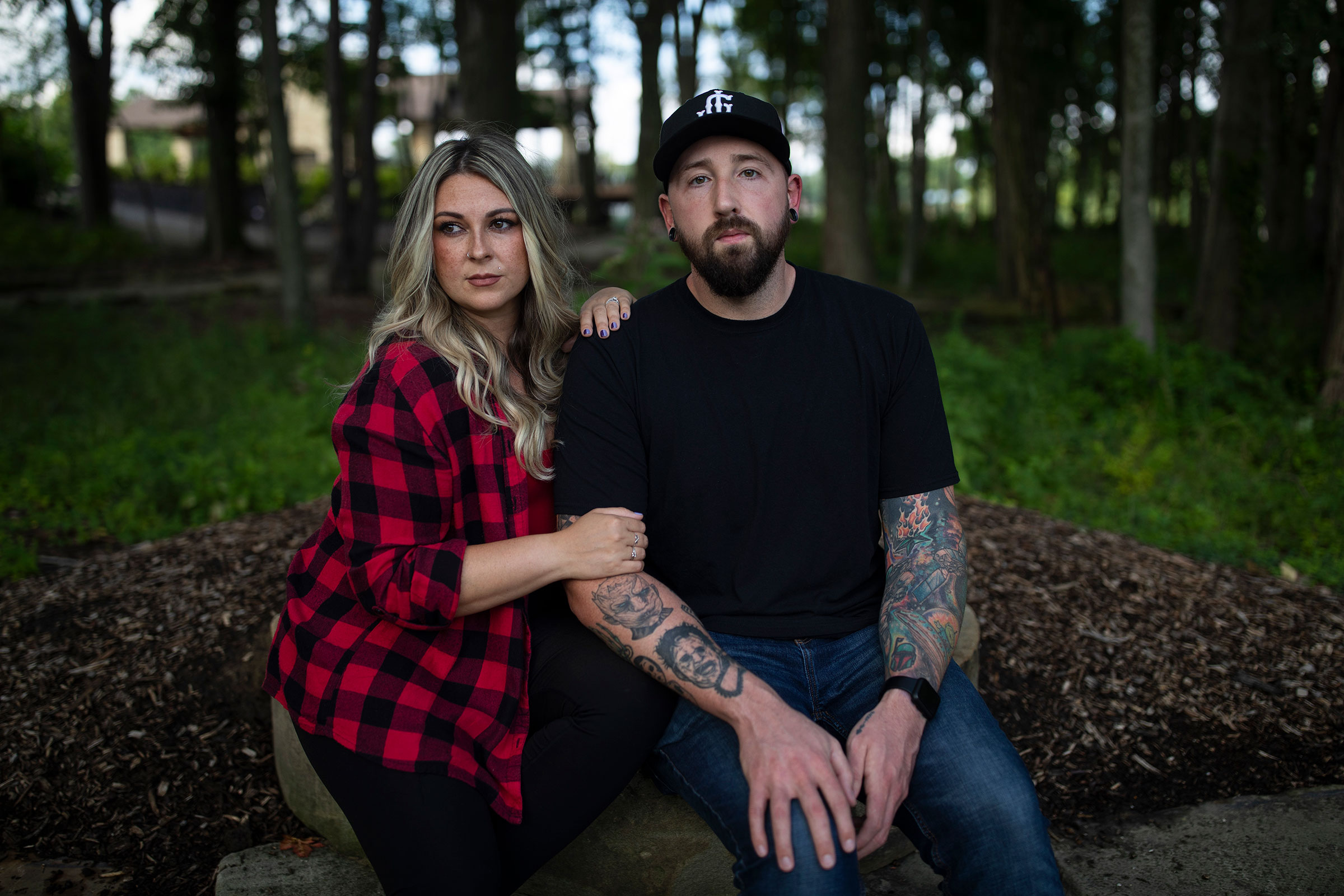
When Tara George’s cell phone rang with a number from Michigan one evening in early August, she knew it would not be good news. As soon as she picked up, the doctor apologized and told her they would have to cancel her abortion appointment the following morning.
Tara’s husband, Justin, who had been downstairs in their northeast Ohio home, came up to check on her when he heard the phone ring. Tara, still listening to the doctor, silently shook her head. Then she hung up and broke down crying.
This was supposed to be a happy time for the George family. They had been thrilled when Tara, 34, got pregnant last spring, and were eager to welcome their first baby. But six days before the doctor’s phone call, with Tara 20 weeks pregnant, the couple had learned their fetus would not likely survive outside the womb. Tara’s OB-GYN told her that if she tried to carry the baby to term, Tara could become dangerously ill or suffer a blood clot that could threaten her life. This was just the beginning of what the couple described as a “never-ending nightmare.”
Even as the Georges’ doctor explained there was nothing else they could do for the baby, she informed Tara and Justin that they couldn’t terminate Tara’s pregnancy in Ohio. The hospital said it wasn’t confident her conditions met the limited exceptions in the state’s new six-week abortion ban, passed in 2019 and put into effect the day the Supreme Court overturned Roe v. Wade. The couple quickly arranged to travel to Michigan for the procedure. But days later, a Michigan appeals court ruled that county prosecutors in the state could start enforcing the state’s 1931 abortion ban. The Michigan hospital where the Georges had arranged to go had stopped all abortions while they figured out the new legal landscape. For the second time in less than a week, Tara and Justin were being denied an abortion they didn’t want to be seeking—but that they and Tara’s doctors agreed was medically necessary—because of the cascade of state laws going into effect without Roe.
In the two months since the Supreme Court’s decision in Dobbs v. Jackson Women’s Health Organization, about a third of states have completely banned or tightly restricted abortion. A complex web of new laws and old ones resurrected by the Court’s decision have rapidly changed the legal terrain for a wide range of health care. Many laws, some of which were written more than a century ago, include no exceptions for rape, incest, or fetal anomalies, and even exceptions for the pregnant person’s life or health are often vague or confusing. In many states, the legality of abortion is changing by the day or hour as judges weigh challenges. At the end of August, federal courts in Texas and Idaho reached opposite rulings about whether doctors need to provide abortions in emergency situations based on federal guidance. “This is just a perpetuation of the chaos that has started since Dobbs came down,” says Greer Donley, a law professor at the University of Pittsburgh who focuses on abortion rights. “The abortion bans are vague—some think that they’re intentionally vague—doctors don’t know how to interpret them, there’s conflicting federal guidance and federal law.”
In this murky and fast-evolving environment, abortion clinics often turn away patients, only to call them back when a court challenge succeeds. Tara eventually got an abortion at a hospital in Michigan amid a sudden change in the procedure’s legal status there. Other clinics have stopped offering abortions even if laws haven’t officially taken effect because conservative prosecutors or other officials have threatened to enforce bans preemptively even as their state’s legality remains unclear. In places where abortion is still legal, wait times are surging as out-of-state patients travel in search of care. At hospitals, fear and confusion is creating dangerous delays for patients experiencing serious pregnancy complications such as ectopic pregnancies, premature rupture of membranes, and miscarriages.
Ohio’s law prohibits abortions after cardiac activity is detected, which can happen around six weeks into pregnancy. The law has an exception for cases that involve a “medical emergency,” which includes situations that could cause a pregnant person’s death or pose a “serious risk of the substantial and irreversible impairment of a major bodily function.” But other than a few specific conditions listed in the law itself, doctors and their lawyers have largely been left to interpret what falls under this exception on their own. Doctors across the state are now consulting with lawyers and getting second opinions on any procedure that might be considered an abortion. “I know what the medical answer is,” says Dr. Mae Winchester, the maternal-fetal medicine physician overseeing Tara’s care. (Winchester declined to speak with the name of her hospital attached because she is not authorized to speak on behalf of the institution.) “But the legal part is what I’ve never had to deal with here before.”

Griffyn Anthony
Tara and Justin grew up in Ohio just 30 minutes away from each other. After meeting through mutual friends 15 years ago, they quickly hit it off and have been together ever since. They married in 2019, and had talked about having two children one day, who they hoped would share their love of Ohio football, Halloween, and horror movies.
In May, the couple found out that their first child would be a boy. They were “ecstatic,” Justin says. They held gender reveal parties for each of their families over Memorial Day Weekend, and settled on a name: Griffyn Anthony.
Tara’s own health meant this would be a high-risk pregnancy, but she wanted to become a mom. She has antiphospholipid antibody syndrome and a Factor V Leiden mutation—blood clotting conditions that put her at high risk for potentially deadly clots. She’d had two serious blood clots, and getting pregnant increased the risk of getting another. Antiphospholipid antibody syndrome in particular is often associated with pregnancy loss and other complications, Winchester says. Tara and Justin were aware of the risks, she was prescribed a blood thinner that required injections twice a day, and at first, her pregnancy went smoothly.
One month after the Georges settled on their baby’s name, the Supreme Court overturned Roe v. Wade. When Justin posted his frustrations about the news on Facebook, citing his wife’s health risks, some friends who supported the Court’s decision assured him that states like Ohio would protect the life of the mother. The exchanges annoyed Justin, but neither he nor Tara thought the situation would apply to them. Tara was into her second trimester of pregnancy—the point, she thought, where you’re supposed to start telling people the news and making concrete plans for the baby’s arrival. The couple had created a registry: a stroller, car seat, diaper bags, Cleveland Browns onesies, Halloween outfits, and swim diapers—already thinking about future experiences with Griffyn. “We were really thinking, Oh, this is great, this is actually happening,” Tara says.
But then, at their 20-week appointment near the end of July, the sonographer grew quiet, and “almost ran out of the room,” Tara says. Justin rubbed Tara’s arm as the couple waited for what felt like an eternity. Eventually, the sonographer returned with Dr. Winchester, who did another look at the ultrasound machine. “She put the tool down,” Tara recalls, “and just looked at us and said, ‘Unfortunately, we need to have a very serious discussion.’”
The fetus’ bladder, Dr. Winchester explained, had stretched to much larger than its normal size. There was no fluid around the fetus, a sign of lower urinary tract obstruction. The pressure from the bladder had backed up into the kidneys and appeared to be causing problems there as well. Studies have shown that lower urinary tract obstruction occurs in about 1 in every 5,000 births. If there’s no fluid around the fetus because it remains stored in the bladder, this can prevent the lung tissue from developing and make it impossible for the baby to breathe on its own after birth.
That wasn’t all. Winchester also saw something abnormal with the fetus’ heart, so she sent them to a pediatric cardiologist the next day. There, the couple learned more disastrous news: one of the fetus’ heart valves was not properly developing, and even under the best circumstances, he would need surgery right away and a transplant later on. Meanwhile, a second test of the fetus’ urine revealed his kidneys were not functioning at all. “We were holding on to that little bit of hope that his heart would be okay, and he would be able to handle what needed to be done,” Tara says. But serious heart problems and the kidney failure meant the doctors couldn’t put in the shunt they would need to treat the bladder issue, and without that, the fetus was very unlikely to make it to full term, or to survive all the procedures he would need if he were born alive. According to Winchester, the chances their baby would leave the hospital alive were under 1%.
All these fetal anomalies also put Tara at greater risk for complications like severe preeclampsia, placental abruption—when the placenta detaches from the wall of the uterus—or blood clots that could lead her to have a pulmonary embolism or stroke. “Do I just wait this out and see if something terrible happens?” Tara thought. As they were talking with Winchester, Tara and Justin decided they needed to terminate her pregnancy. “We just thought, at this point, there’s nothing they can do for him,” Tara says.
Caught in national chaos
Winchester warned the couple that with Ohio’s abortion ban in effect, she’d have to ask the hospital for permission to do the procedure there. “I thought this was a no-brainer situation,” Justin says. But the hospital disagreed. Tara’s health might be at risk, but under Ohio’s new law, they didn’t think it was enough to withstand legal scrutiny, according to Winchester.
Tara recalls feeling “livid” when she heard the news. She describes herself as someone who “doesn’t follow politics” and had previously thought of herself as “pro-choice” only in abstract terms. “There’s so many people that just think it’s black and white. It’s either, okay, you’re getting an abortion because you just don’t want to be pregnant. Or there’s the people that are pro-choice who are like, you should have the right to decide what you want to do with your body. And sometimes it’s not either of those,” she says. “We were put in a situation where we didn’t really have a choice for any kind of happy outcome. And yet, we were still denied.”
Winchester got in touch with physicians in Michigan and Pennsylvania—nearby states where abortion is still legal until later in pregnancy. Research has shown that abortions have much lower risks of complications and death than pregnancy, but because of Tara’s clotting disorders, she would need the procedure done in a hospital. This made the scheduling more complex, and would mean the couple had to trust a whole new set of doctors, take time off work, find a hotel, pay for gas, and drive hours across state lines. (Tara, a hair stylist, doesn’t have paid vacation days; Justin, a quality manager at a steel factory, was quickly using his up.) They chose a hospital in Michigan that allowed Tara to do the initial appointment virtually, and planned to drive up the next day for her two-day procedure. (The Michigan hospital declined to be named in light of the ongoing legal challenges in the state.)
But when Tara logged on to the video appointment the morning of Aug. 1, her plans were interrupted once again. In Michigan, abortion is legal until the point of viability—when a fetus can survive outside the womb—usually around 24 weeks, which Tara hadn’t yet reached. But the state never repealed a 1931 ban on abortion from before Roe, and now Republicans want to enforce it. While Planned Parenthood and Gov. Gretchen Whitmer, a Democrat, each sued to block the law earlier this year, the Michigan Court of Appeals ruled on Aug. 1 that county prosecutors could enforce the law, throwing the state into uncertainty. The Michigan doctor wasn’t sure what the ruling would mean yet, so she went through with the consultation and promised to update Tara as soon as she knew whether they could move forward.
That night was when the doctor called back to cancel the abortion. “It was so taxing on both of us emotionally, even physically,” Justin recalls. “You can’t sleep, you can’t eat. And then you just keep getting these horrible phone calls. You’re canceling hotels, you’re missing time from work, you have to reschedule days. It just got to be so much within just a few days. It was nuts.”
Tara texted Winchester, who said she would reach back out to the Pennsylvania hospital. The next morning, Tara heard from a staffer at the hospital in Pennsylvania that they would do the procedure but wouldn’t be able to fit her in for another week. At this point, Tara was 21 weeks and four days pregnant, and getting close to the limit of when neighboring states would be able to help her. (Pennsylvania also allows abortions up to 24 weeks of pregnancy). If Pennsylvania didn’t work out, Winchester suggested they consider Illinois or Maryland, both farther trips.
But an hour later, Tara received another call from Michigan. It was the same doctor from the day before, telling her the hospital had reversed its decision and could perform her abortion after all. A circuit judge in Michigan had issued a temporary restraining order at the end of the previous day, stopping enforcement of the 1931 ban again. If the couple could get there that afternoon, the hospital could see them right away, before the legal environment might change again.

‘Am I going to be supported?’
The couple reached the Michigan hospital by mid-afternoon. There, Tara would have a procedure known as a D&E, dilation and evacuation, over two days. On the first day, the doctor would use an injection to stop the fetus’ heart and dilate her cervix to prepare for removing the fetus on the second day.
While they waited, Justin tried to keep the mood light, but Tara couldn’t shake the fear of the doctors canceling again. They moved between waiting rooms for hours while it seemed that doctors tried to squeeze them into an already crowded schedule.
But they were able to complete the procedure. When Tara woke up from it, she immediately started crying. She felt some sense of relief. But the reality of her loss and what they’d had to go through finally broke through the shock too. “I wouldn’t wish that on anybody,” Tara says.
Tara and Justin are recovering from their experience, but they can’t stop thinking about all the other women who are going through similar situations without the same resources. They still don’t know whether their insurance will cover Tara’s care and are waiting for the day a potentially crushing bill arrives in the mail. But they know they’re lucky they could afford to travel across state lines, and Winchester told them she can connect them with assistance programs if needed to help pay the medical bills.
The couple also wants their community to understand. The Sunday before Tara’s procedure, they posted a joint message on Facebook telling people “it’s going to take a little longer to start our family.” Many people assumed Tara had a miscarriage, and while their messages were supportive, she knows that some of them are the same ones who publicly cheered Roe’s overturning and supported Ohio’s law. “If we were to tell you what we had to go through, would you still be on our side?” she wondered. “Or would you look at us differently?”
The Georges want to try to have another baby. They went through a round of genetic testing after returning from Michigan to try to determine what caused their fetus’ anomalies. Everything came back clear. But they also know that if they conceive again and have more medical problems, the situation could be even more dangerous. Conservative lawmakers in Ohio and other states have expressed interest in further restricting abortion, and in some cases, in trying to stop people from traveling out of state to access the procedure.
“If we try again, what if all of a sudden there is something else that comes out that prevents travel at all?” Tara says. “Am I going to be supported?”
More Must-Reads from TIME
- Cybersecurity Experts Are Sounding the Alarm on DOGE
- Meet the 2025 Women of the Year
- The Harsh Truth About Disability Inclusion
- Why Do More Young Adults Have Cancer?
- Colman Domingo Leads With Radical Love
- How to Get Better at Doing Things Alone
- Michelle Zauner Stares Down the Darkness
Write to Abigail Abrams at abigail.abrams@time.com